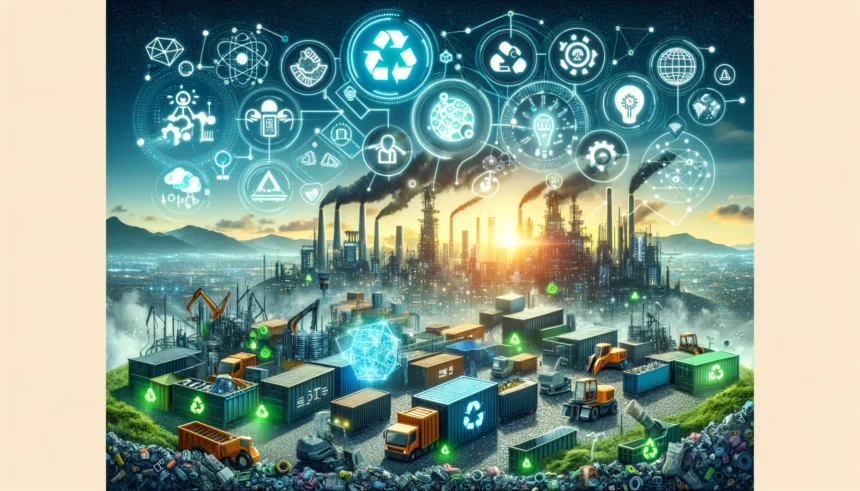Listen to the article now:
As the world grapples with escalating energy concerns and a surging demand for secondary raw materials, the recycling industry is on the brink of a revolution. The year 2024 heralds a wave of innovative trends poised to redefine recycling efficiency and sustainability. Here’s an in-depth look at the top 8 recycling technology trends shaping the future.
1. Internet of Waste
The integration of the Internet of Things (IoT) in waste management exemplifies how technology can streamline recycling operations. With innovations like fill-level sensors, smart bins, and material quality assessing sensors, the recycling sector is making strides towards optimized collection and processing. This move not only shifts recycling workflows to be more responsive to waste generation but also paves the way for data-driven optimization strategies.
2. Chemical Recycling
The push for sustainable development and consumer demand for eco-friendly products have steered the recycling industry towards chemical recycling. Techniques such as pyrolysis, gasification, and solvolysis promise to reclaim materials while maintaining their quality, offering a greener alternative to traditional methods. The rise of chemical recycling heralds a new era where secondary materials can seamlessly replace virgin resources, cutting down carbon footprints and opening new markets.
3. Recycling Robots
To combat the challenges of waste contamination and labor shortages, the industry is turning to recycling robots. Equipped with AI for advanced sorting and classification, these robots enhance the efficiency of material recovery facilities by speeding up the sorting process, reducing errors, and lowering operational costs. The automation of sorting lines not only ensures a higher quality of recyclable materials but also offers a glimpse into the future of waste management.
4. Waste Valorization
Innovative recycling technologies are now capable of upcycling waste into more valuable products or energy sources, transcending traditional recycling paradigms. Startups are leading the charge with technologies that convert organic waste into biogas or transform solid waste into energy and chemicals, showcasing the potential for waste to contribute positively to the energy grid and the economy.
5. Artificial Intelligence
Artificial intelligence is revolutionizing the recycling industry by automating tasks such as material analysis, sorting, and picking. By leveraging machine learning and computer vision, AI technologies improve the efficiency of recycling processes, enhance worker safety, and optimize logistic operations. The potential for AI to increase the value recovered from waste is immense, marking a significant step towards smarter, more sustainable recycling practices.
6. Green Waste Management
With food waste significantly impacting greenhouse gas emissions, the focus on green waste management has never been more critical. Startups are developing innovative solutions to process organic waste, reducing emissions and generating valuable materials like biofuel and fertilizers. The adoption of biopolymers further enriches the ecosystem for materials sourced from biomass waste, highlighting the importance of green waste management in the circular economy.
7. Material Life Cycle Extension
The quest for sustainable recycling solutions has led to the development of technologies aimed at extending the life cycle of materials. Techniques such as closed-loop recycling and advanced chemical treatments promise to enhance the recyclability of materials like plastics, metals, and glass. By producing high-quality secondary materials, these innovations reduce reliance on virgin resources and support the vision of a circular economy.
8. Big Data & Analytics
Lastly, the recycling industry’s embrace of big data and analytics marks a significant leap towards operational efficiency and transparency. By analyzing data from various points within the recycling ecosystem, companies can identify inefficiencies, optimize processes, and even predict waste generation trends. This digital transformation is not only making recycling operations more efficient but also more adaptable to the evolving demands of society and the environment.
The year 2024 stands as a milestone for recycling technology, with these eight trends leading the charge towards a more sustainable and efficient future. As the recycling industry continues to evolve, the integration of these innovations promises to address some of the most pressing environmental challenges of our time, forging a path towards a cleaner, greener planet.
















